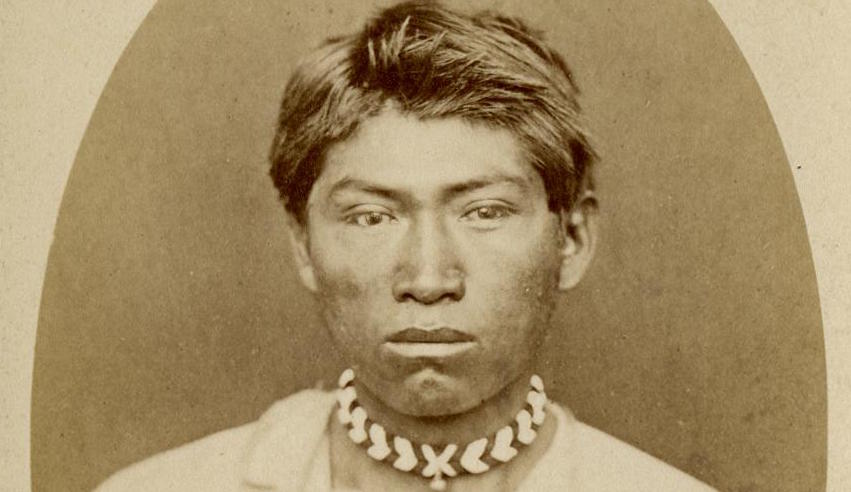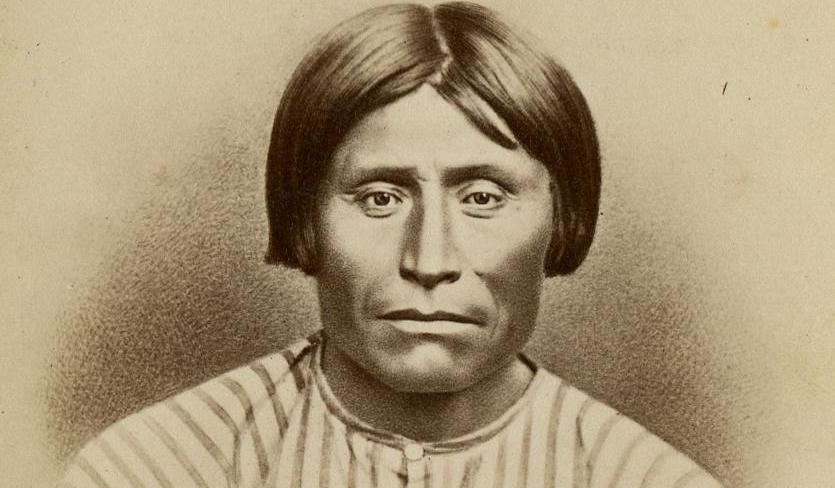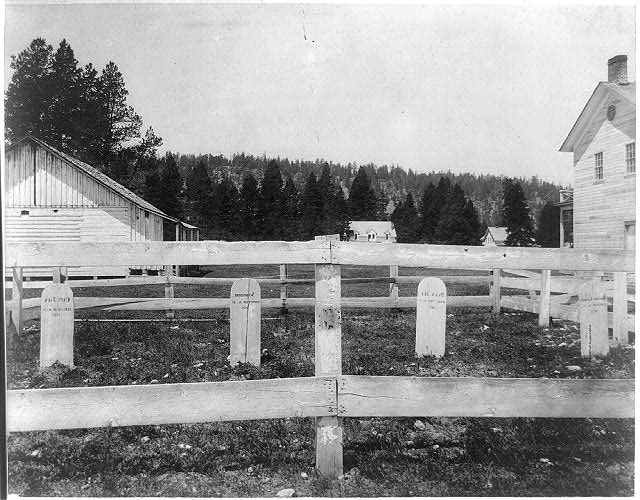At first glance, the U.S. government’s war against the Modoc nation was a fairly typical Indian war. White settlers in California and Oregon wanted the Modocs’ land, so the federal government forcibly relocated the Natives. When the Modocs tried to move back, they were killed. But from that war emerged a figure – a treacherous, shameful snake – who makes amazing inspiration for a contemptible NPC.
This post is brought to you by beloved Patreon backer Justin Moor. Thanks for helping keep the lights on! If you want to help keep this blog going alongside Justin, head over to the Patreon page – and thank you!

There were many Native nations and bands in California before the Americans, Spaniards, and Russians arrived. Most are completely extinct, exterminated by white settlers. The Modoc nation came into conflict with the U.S. government comparatively late because their land was less valuable. In 1864, the U.S. shuffled the defeated Modoc off to a too-small reservation in Oregon. The Modoc had to share the reservation with the Klamath nation, whose land it originally was. In 1872, disease and deprivation drove many Modocs off the reservation, back to their ancestral lands along the Lost River in California. One of these refugees was a Modoc man known by his English-language nickname, Hooker Jim.
Hooker Jim took some of his followers away from the main band of refugees. One night, as they were camping, white settlers confronted them. The settlers killed an old woman, shot a baby in its mother’s arms, and wounded several old men. Understandably terrified, Hooker Jim fled south with his people to rejoin the other refugees. Along the way, they avenged their dead by stopping at farmhouses and killing settlers, twelve in all. These people were noncombatants, and some of them were old friends of the Modocs.
The main band of refugees was led by a cautious, sensible chief named Kintpuash. They’d also suffered attacks along the way and were holed up in an ancient lava field. The tunnels and bowls created highly defensible terrain. It would take an army to root them out. Kintpuash was aghast when he learned what Hooker Jim had done, but took Hooker Jim in all the same. A leader does not abandon his people, even if those people’s actions guaranteed federal troops would come seeking revenge.

The U.S. Army surrounded the lava fields. Kintpuash wanted to surrender; he knew this was not a fight the Modocs could win. Hooker Jim would have none of it. If the Modocs surrendered, the Army would hang him! Hooker Jim forced Kintpuash to call a council to vote on what to do, and of the 51 warriors in the lava fields, Hooker Jim convinced 37 to vote to fight to the death.
A few days later, Hooker Jim and eight of his followers snuck through the lines and offered to surrender to the American general, Edward Canby. This was, of course, despite getting the rest of the Modocs to agree to die protecting them. Canby was so excited he sent a message to Kintpuash offering to meet to discuss getting the Modocs back to the reservation and forgot to actually arrest his nine Modoc POWs. Hooker Jim wandered through the government camp until he met someone who recognized him from his attacks on the farmhouses. The soldier said the governor was hopping mad about the killings. The governor insisted Hooker Jim be handed over to civil authorities and tried for murder, for which Jim would certainly be hanged.
So Hooker Jim fled back to Kintpuash and told the chief that the meeting with Canby was a ruse. Canby would lure them all out of the lava fields and hang them. (Which, to be fair, was consistent with other incidents and could well have been true.) Over the next few months of siege, Kintpuash tried every diplomatic channel he could: intermediaries, backchannels, and even face-to-face meetings with Canby and his staff. None extricated him from this dilemma: it was not possible to surrender without handing over Hooker Jim for execution.

Hooker Jim didn’t approve of all this talking. In council, he demanded Kintpuash kill General Canby the next time he saw him. Kintpuash refused. Jim called him a blind fool. Kintpuash turned to go. Jim threw a woman’s shawl over Kintpuash and called him “a fish-hearted woman. You are not a Modoc. We disown you.” Insulted, shamed, and infuriated, Kintpuash agreed to kill Canby. And so the general died. Incredibly, Kintpuash got away from the Army camp after the assassination. When government soldiers overran the lava fields six days later, Hooker Jim and Kintpuash escaped again.
But Hooker Jim wasn’t done taking advantage of Kintpuash’s generosity. When Hooker Jim disagreed with Kintpuash on a survival strategy, Jim and his followers abandoned the chief. He left the man who’d saved their lives by taking them in – and likely doomed his people as a result – with only 37 fighters to hold off a force of 1,000. Then Hooker Jim went to the Army. He agreed to surrender and help the Army hunt down Kintpuash in exchange for a pardon. When Hooker Jim caught up with Kintpuash, the chief’s speech to his betrayer was amazing:
“You come here riding soldiers’ horses, armed with government guns. You intend to buy your liberty and freedom by running me to earth and delivering me to the soldiers. You realize that life is sweet, but you did not think so when you forced me to promise that I would kill that man, Canby. I knew life was sweet all the time; that is the reason I did not want to fight the white people. I thought we would stand side by side if we did fight, and die fighting. I see now I am the only one to forfeit my life for killing Canby, perhaps one or two others. You and all the others that gave themselves up are getting along fine, and have plenty to eat. Oh, you bird-hearted men!”
Kintpuash was given a show trial and hanged. The surviving Modocs were exiled to Indian Territory, in Oklahoma. Hooker Jim died in Oklahoma six years later.

What makes an NPC based on Hooker Jim so effective is that we all know someone like that: someone who makes her troubles your troubles, then absolves herself of responsibility. Someone who bullies and insults you into behaving as she wants, then lets you suffer all the consequences. Someone who will demand every kind of charity from you, then throw you away when you’re no longer useful to her. We learn early how to cut off contact with strangers like that – but people to whom we have obligations are harder. That’s the key for making a Hooker-Jim-type NPC.
So what kinds of obligations can force the PCs to keep an NPC based on Hooker Jim in their lives? Immediate family is an obvious one. The NPC might be a PC’s sibling, parent, or child. In real life, the obligation was political. As chief, Kintpuash had an obligation to safeguard Hooker Jim and look after his interests. You might also make the NPC someone the PCs need something from, like a mentor, patron, or financial backer. You might be tempted to make the NPC an old friend of the PCs, but that’s less likely to work. Players tend to be more willing to cut ties with their character’s friends than normal people are in real life – and you want that NPC to be someone the party can’t say ‘no’ to, however much they may want to!
Once your Hooker-Jim-type NPC is in the campaign, she’s an endless source of plot complications. She stole something, and now the PCs have to hide her while the law comes sniffing around. She revealed a PC’s secret, and now the party has to rebuild trust in the community. She makes demands on the party’s time, and now they have to rush the thing they care about, and suffer penalties. She may ask for a cut of their loot or otherwise make herself a nuisance. And when she’s gotten all she can out of them, she cuts them loose, ideally leaving the party in as precarious a situation as possible.
Remember to start your Hooker-Jim-style NPC off as a good guy! In real history, all this trouble started when white settlers attacked Hooker Jim’s people without provocation and killed several noncombatants. If your NPC is a bastard from the start, the players are less likely to let her stick around.
–
Source: Bury My Heart at Wounded Knee: An Indian History of the American West by Dee Brown (1970)






